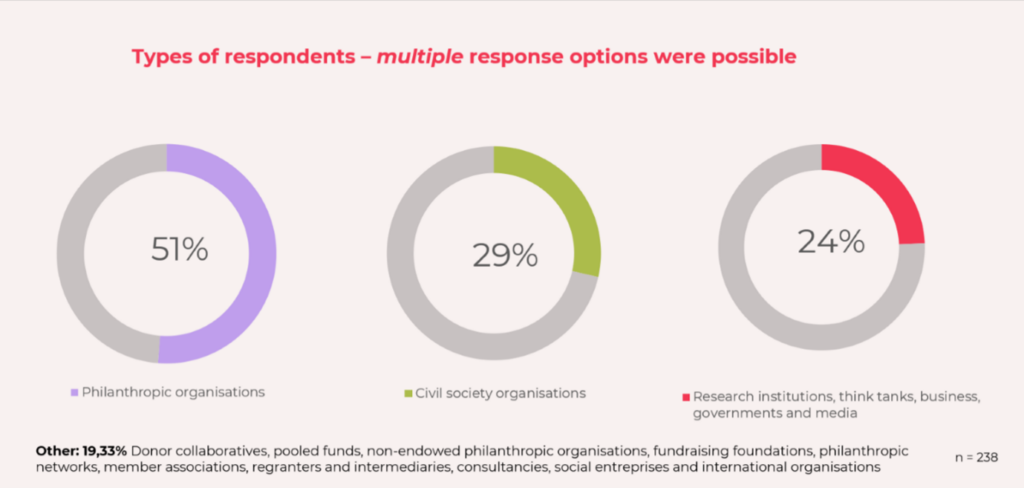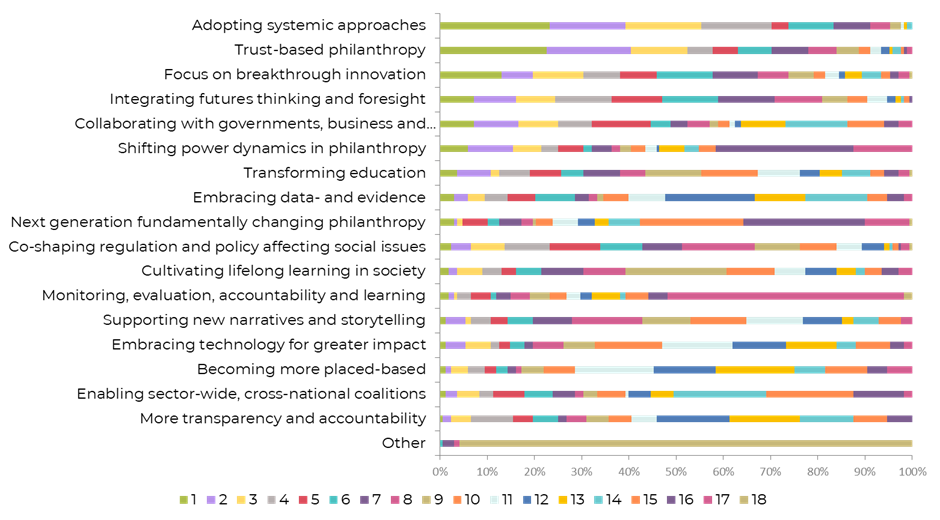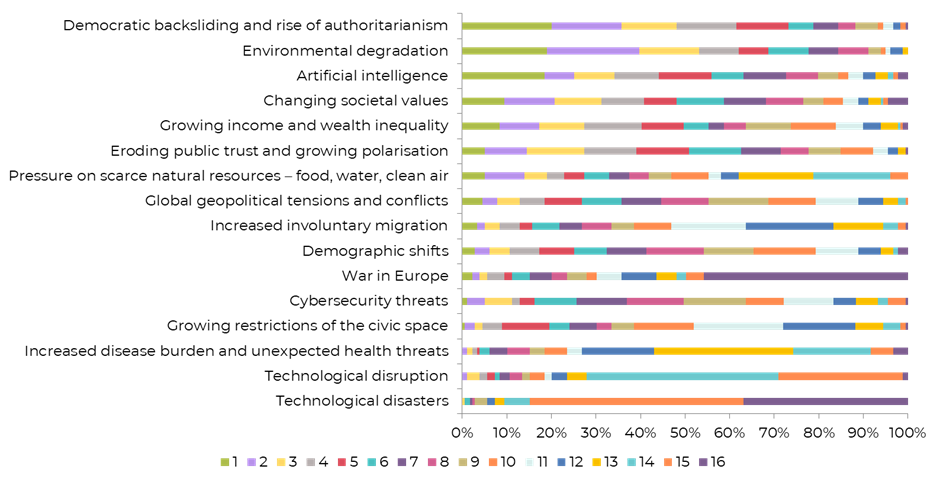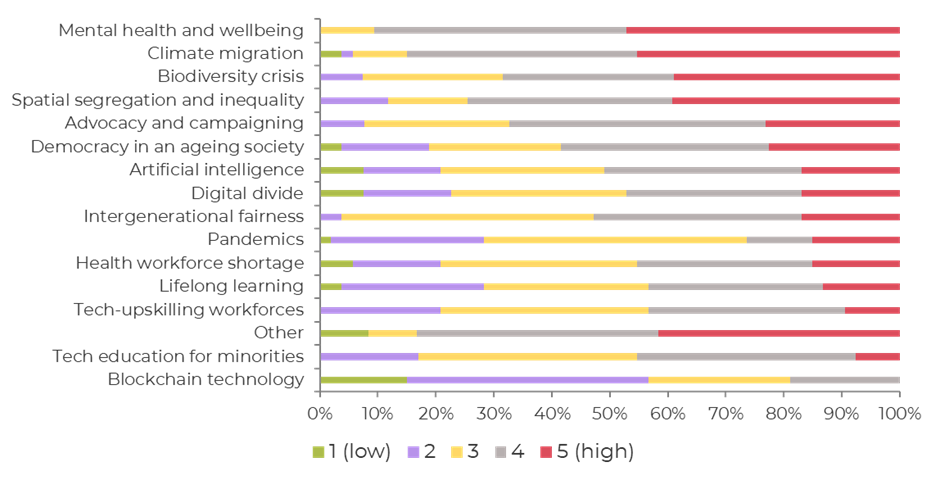Exploring 21st century philanthropy
Section

From May to August 2023, Philea conducted its first “Exploring 21st century philanthropy” survey with a wide range of organisations* representing philanthropy, civil society, academia, business, media and governments.
The aim? To explore megatrends, critical vulnerabilities, risks and opportunities and provide insights on the future of society and philanthropy in the coming decade.
In what follows, we will focus on the key highlights from the survey and what we interpret from them. In upcoming editions, we will discuss internal risks facing philanthropy in the next decade and implications for future action.
So, what do we think the future of philanthropy might look like? Let’s start with the following key takeaways:
- A recognition of the need for more collective thinking and action between foundations
- The Philea priorities of climate, democracy and inequality match the megatrends our respondents highlighted
- More attention is needed in the areas of mental health and advocacy
View the presentation of Exploring 21st century philanthropy results

Megatrends and underfunded areas
American writer John Naisbitt, who himself coined the term “megatrend”, explained that “trends, like horses, are easier to ride in the direction they are going.” 201 survey respondents ranked a list of megatrends provided by Philea and the Copenhagen Institute for Future Studies (CIFS) and added 117 comments suggesting further critical issues.
The top five megatrends were identified as:
- Climate and environmental degradation
- Artificial intelligence and automation
- Concentration of wealth
- Climate migration
- Rising influence of new governing systems
We also asked respondents to help provide insights into the most urgently underfunded areas, as a first attempt to understand where philanthropic engagement is needed most today and in the future. The priority list was:
- Climate migration
- Biodiversity crisis
- Mental health and wellbeing
- Spatial segregation and inequality
- Advocacy and campaigning
Interestingly, AI did not feature as highly as maybe one would anticipate – does that mean it is seen more as a fad? Climate maintained its prominence, and mental health emerged as a key future issue. The need for greater advocacy and campaigning support ties into the megatrend of backsliding democracy, and there was clear sentiment for more governmental engagement and partnerships with donors and funders as well as within the philanthropy sector.
Key area 1: Addressing climate crisis – from awareness to action
While the climate crisis is high on the agenda throughout the survey, respondents commented on the lack of awareness around effective solutions to complex issues such as environmental degradation, involuntary migration, competition for resources or biodiversity loss.
Philanthropic funding going towards climate mitigation has more than tripled since 2015, increasing from $900 million to more than $3 billion in 2021 according to the ClimateWorks Foundation. This was driven by the arrival of some major donors (Bezos Earth Fund) and climate pledges from existing foundations (Bloomberg Philanthropies, the IKEA Foundation, the Rockefeller Foundation). The Philea mapping “Environmental funding by European foundations vol.6” documented a similar trend with an increase of 48% of climate funding, from €708 million in 2018, to over €1 billion in 2021.
However, in comparison to the scale of challenges such as reversing biodiversity loss or decarbonising our economies, this amount remains both insignificant, and limited in impact, as confirmed by the Center for Effective Philanthropy study. Clearly, foundation and non-profit leaders believe philanthropic efforts to address climate change have not been effective enough in light of the scale of the crisis. More collaboration is needed to translate awareness into action, and, unsurprisingly, climate action discourse is shifting towards. Environmental funders are paying more attention to “deeper systems change work”. This corresponds with the overall expectation towards philanthropy in the next decade identified in the survey, with adapting systemic approaches considered the most relevant opportunity for philanthropy in the next 10 years, as many foundations have also started integrating the climate lens throughout their portfolios and investments, moving beyond funding.
More collaboration is needed to translate awareness into action, and, unsurprisingly, climate action discourse is shifting towards systemic approaches, now considered the most relevant. Environmental funders are paying more attention to “deeper systems change work”. This corresponds with the overall expectation towards philanthropy in the next decade identified in the survey, with adapting systemic approaches considered the most relevant opportunity for philanthropy in the next 10 years, as many foundations have also started integrating the climate lens throughout their portfolios and investments, moving beyond funding.
The most relevant opportunities for philanthropy in the next 10 years. n=168

Key area 2: Democratic backsliding and the rise of authoritarianism
The theme of retreating democracy, growing polarisation and societal divide was clear throughout the survey results. One of the respondents critically observed: “More former democratic states will develop into semi-democratic, populistic and authoritarian systems; there will be a strong competition of systems where democracy is only one option as a path ahead.” Another participant mentioned that “after continued failed attempts to tackle the most critical pitfalls of global economic and political systems, the distrust in both national and international institutions will keep on growing exponentially”.
According to the International Institute for Democracy and Electoral Assistance (IDEA), half of the world’s democracies today are in a state of decline amid worsening civil liberties and rule of law, while the number of countries moving towards authoritarianism is more than double the countries moving towards democracy. Already authoritarian countries are becoming more oppressive.
Ranking uncertainties: The most critical societal issues that philanthropy needs to pay attention to in the next 10 years, n=179

Lack of trust in public institutions and governments, economic insecurity, disinformation and radicalisation of political discourses on issues such as migration, gender and racial equity are mentioned throughout the survey responses as major drivers of a deepening societal divide. The underlying root causes of growing polarisation are linked to the rise of inequalities between and within countries and the concentration of wealth. The Edelman Trust Barometer mentions “mass-class divide” as one of the forces driving societal distrust. Thus, people in the top quartile of income experience a different trust reality than the ones in the low-income in the bottom quartile.
How can philanthropy respond to growing polarisation and backsliding democracy? To be able to answer this question, we need deeper understanding of philanthropic democracy funding: the major donors and their approaches, and where the gaps lie. Candid provides this data for the US: where democracy funding has increased from $740.2 million in 2011 to $2.4 billion in 2018, a growth of 300%. In Europe, there is no comparable data yet, leaving only educated guesses. The recent retreat of the Open Society Foundations from the region, a major democracy and civil society donor with an annual global giving of approximately €1.5 billion and over €209 million in Europe, is likely to have a lasting impact, particularly on human rights groups and watchdog media unable to receive funding elsewhere. The need to increase long-term democracy funding in Europe is paramount.
Key area 3: Mental health and wellbeing emerging as a funding priority
Respondents representing civil society organisations, 55 from the overall sample, chose mental health and wellbeing as the number one priority for philanthropy in the coming decade. This is a warning signal to all philanthropic organisations – regardless of their mission – and a growing trend. By 2030, depression alone is likely to become the second highest cause of disease burden in middle-income countries and third leading cause in low-income countries, as predicted by experts. The WHO mental health atlas shows rampant regional inequalities and disparities in the availability and allocation of mental health resources and personnel. While the levels of global public expenditure on mental health remain low overall (2.1%), they are negligible in low- and middle-income countries. The median ratio of mental health workers is 13 per 100.000 population globally.
Potential future societal vulnerabilities that will need more philanthropic engagement in the next decade. Answers by civil society organisations, n=55.

Some respondents emphasised the severe impact of social media on the mental health of young people, in particular those who are increasingly experiencing depression and anxiety. As observed in one of the comments: “The youth population represents the future of Europe. Their aspirations, values, and engagement in various areas, including politics, technology, and social issues, can shape the trajectory of the continent. Youth unemployment, education, mental health, and social inclusion are some key concerns related to this demographic”. While there has been increasing funder focus on mental health, much more remains to be done. This will require broad collaboration across sectors with greater focus on advocacy efforts to allocate resources to what could yet prove to be one of the defining challenges of our time.
Conclusion
Future-shaping trends are interconnected and interdependent while having different time scales and levels of impact. Together, they form a complex weave, where pulling one thread may change the details of the overall tapestry. Trends also blend into one another, making it difficult to separate as we have seen with environmental degradation, climate migration and inequalities. These complexities, and the uncertainties contained within them, are what make foresight and strategic planning very difficult, but very important.
There is no playbook on how to tackle complex issues such as biodiversity loss, backsliding democracy or mental health, but the urgency of the moment is clear. It is also clear that we require a collective effort to shift narratives and common perceptions. Philea is committed towards translating these insights into joint action and increasing collective capacities to anticipate emerging risks and opportunities through the Futures Philanthropy initiative.
About Exploring 21st century philanthropy survey:
*238 responses were provided in total, with a diverse geographic focus. The overall sample consisted of philanthropic organisations, civil society organisations, research institutions, think tanks, governments and media and other type of organisations. Other philanthropic entities included donor collaboratives, pooled funds, fundraising foundations, re-granters and intermediaries.
About Philea’s Futures Philanthropy initiative
The scale of today’s challenges requires the philanthropic sector to collectively imagine how a different tomorrow could be created. Futures Philanthropy is dedicated to building futures literacy to support long-term thinking and transformative change in the philanthropic community. We do this through the provision of research and a wide-ranging programme that offers opportunities for collaboration and learning.
Contact

